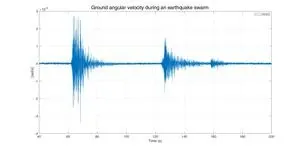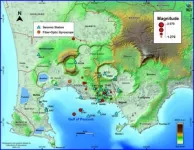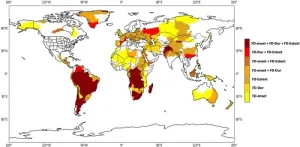(Press-News.org) FOR IMMEDIATE RELEASE
A novel therapy that reprograms immune cells to promote antitumor activity helped shrink hard-to-treat prostate and bladder cancers in mice, according to research from the Johns Hopkins Kimmel Cancer Center and its Bloomberg~Kimmel Institute for Cancer Immunotherapy and Johns Hopkins Drug Discovery.
The study was published online May 3 in the journal Cancer Immunology Research, a journal of the American Association for Cancer Research.
Immunotherapies that help the immune system recognize and fight tumors have revolutionized care for many types of cancer. However, these therapies, which ramp up the production and activation of tumor cell-killing immune cells called T-cells, have not been effective in aggressive forms of prostate and bladder cancers. The field of oncology has been trying to find out why and how to make immunotherapies work better in these cancers, explains the study’s senior author, Jelani Zarif, Ph.D., Robert E. Meyerhoff Endowed Professor and associate professor of oncology at Johns Hopkins. Zarif and his colleagues suspected that immune cells called macrophages were to blame. Under some conditions, macrophages help tumors grow and suppress T-cell activity, hampering the immune response to cancers.
“The focus of our work is to reprogram the immune-suppressive tumor-associated macrophages into anticancer immune cells to enhance therapeutic responses to immunotherapies and other standard-of-care cancer therapies,” Zarif says.
The immune-suppressing macrophages rely on the amino acid glutamine. Zarif and his colleagues previously demonstrated that macrophage precursor cells called monocytes will develop into immune-activating macrophages if they are grown in a laboratory setting without glutamine. By contrast, when monocytes are grown with glutamine, they become immune-suppressing macrophages.
Zarif and his team hypothesized that drugs blocking the immune cells from accessing glutamine would shift the balance of macrophages toward the immune-stimulating type and help shrink tumors. Studies have shown that a drug called 6-diazo-5-oxo-L-norleucine (DON) that starves tumors of glutamine shrinks tumors that depend on glutamine to grow. But development of the drug as a therapy for cancer was abandoned decades ago because it was also toxic to the gastrointestinal system and caused harmful side effects.
Instead, Zarif tapped an experimental glutamine-blocking drug developed by study co-authors Barbara Slusher, Ph.D., director of Johns Hopkins Drug Discovery, and Jonathan Powell, M.D., Ph.D., former associate director of the Bloomberg~Kimmel Institute for Cancer Immunotherapy. The drug, JHU083, is a type of molecule called a prodrug that cells inside the body convert into an active drug. Specifically, JHU083 can only be turned into its active, glutamine-blocking form inside the tumor, preventing it from causing harmful side effects elsewhere in the body. Studies show the drug shrinks tumors, reduces cancer spread and increases survival in animals with cancers of the skin, colon, blood and brain, as well as certain treatment-resistant breast cancers.
“Barbara Slusher and her team changed the drug’s chemistry so it can circulate inactive throughout the body, and it only becomes active when it gets inside cancer cells,” Zarif explains. “Because the active form is only released to cancer cells, you can give a lower dose, further reducing the risk of side effects.”
Zarif and his colleagues showed that JHU083 blocks the use of glutamine in prostate and bladder tumors in mice, reducing tumor growth and triggering tumor cell death. It also reprogrammed immune-suppressing macrophages into immune-boosting macrophages. The macrophages themselves started destroying tumor cells. They also helped recruit tumor-killing T-cells and natural killer cells to the tumors. Adding an immunotherapy called a checkpoint inhibitor, which boosts the activation of T-cells in tumors, did not increase the effects of JHU083. Zarif explained this is likely because there was already so much antitumor immune activity in the JHU083-treated tumors.
“JHU083 could be a promising anti-cancer therapy for tumors with immune-suppressing macrophages and too few T-cells,” he says. “It might also be a promising agent for tumors that do not respond to checkpoint inhibitors.”
Zarif plans to collaborate with colleagues at Johns Hopkins to launch a clinical trial of JHU083 in patients with treatment-resistant prostate or bladder cancer to see if it shrinks tumors and prevents metastasis. They also want to continue studying whether combining JHU083 with other treatments improves its effectiveness against tumors.
The study’s other co-authors were Monali Praharaj, Fan Shen, Alex J. Lee, Liang Zhao, Thomas R. Nirschl, Debebe Theodros, Alok K. Singh, Xiaoxu Wang, Kenneth M. Adusei, Kara A. Lombardo, Raekwon A. Williams, Laura A. Sena, Elizabeth A. Thompson, Ada Tam, Srinivasan Yegnasubramanian, Edward J. Pearce, Robert D. Leone, Jesse Alt, Rana Rais and Drew M. Pardoll of Johns Hopkins.
This work was supported in part by the Bloomberg∼Kimmel Institute for Cancer Immunotherapy, a Prostate Cancer Foundation Young Investigator Award, the National Institutes of Health/National Cancer Institute (grant K22 CA237623), the National institutes of Health (grants #R01CA283649 and #R01CA229451) and a Maryland Cigarette Restitution Fund grant (#FHB33CRF).
The Johns Hopkins University has filed patent applications related to technologies described in the paper on which Slusher, Powell, Leone, Rais and Alt are listed as inventors. Slusher, Powell and Rais are also co-founders of and consultants for Dracen Pharmaceuticals. These relationships are being managed by Johns Hopkins University in accordance with its conflict-of-interest policies.
END
Drug helps reprogram macrophage immune cells, suppress prostate and bladder tumor growth
2024-05-21
ELSE PRESS RELEASES FROM THIS DATE:
Green infrastructure plans need to consider historical racial inequalities, say researchers
2024-05-21
CHAMPAIGN, Ill. — Urban planners increasingly are interested in green infrastructure projects for the health and climate benefits they bring to cities. But without attention to historical development patterns and existing power structures, such projects may not benefit all residents equally and may exacerbate social and racial inequalities, says a group of researchers and practitioners of nature-based solutions for urban areas.
The researchers outlined their recommendations for a justice-oriented approach to urban greening projects in a paper published in the journal ...
ENDO 2024 press conferences to highlight male birth control, anti-obesity medications
2024-05-21
BOSTON—Researchers will delve into emerging research in diabetes, obesity, reproductive health and other aspects of hormone health during the Endocrine Society’s ENDO 2024 news conferences June 1-4.
The Society also will share its vitamin D Clinical Practice Guideline publicly for the first time during a news conference on Monday, June 3. Reporters will have an opportunity to hear directly from members of the guideline development panel.
Other press conferences will feature select abstracts that are being presented at ENDO 2024, the Endocrine Society’s ...
Highly sensitive fiber optic gyroscope senses rotational ground motion around active volcano
2024-05-21
WASHINGTON — Researchers have built a prototype fiber optic gyroscope for high resolution, real-time monitoring of ground rotations caused by earthquakes in the active volcanic area of Campi Flegrei in Naples, Italy. A better understanding of the seismic activity in this highly populated area could improve risk assessment and might lead to improved early warning systems.
“When seismic activity occurs, the Earth’s surface experiences both linear and rotational movements,” said research team leader Saverio Avino from the Consiglio Nazionale delle Ricerche Istituto Nazionale di Ottica (CNR-INO) ...
Research reveals endurance exercise training impacts biological molecules
2024-05-21
As part of an ongoing national research effort to better understand how physical activity improves health and prevents disease, seven University of Colorado Department of Medicine faculty members contributed to an article recently published in Nature, an international journal of science.
The paper, “Temporal dynamics of the multi-omic response to endurance exercise training,” discusses how eight weeks of endurance exercise training affected male and female young adult rats. The researchers found that all bodily tissues that were tested ...
Does managing oxidative stress hold the key to effectively treating Alzheimer’s disease
2024-05-21
Amsterdam, May 21, 2024 – The number of people suffering from Alzheimer’s disease (AD) is expected to reach 100 million by 2050, but there is still no effective therapy. Leading researchers from around the world assess how oxidative stress (OS) may trigger AD and consider potential therapeutic targets and neuroprotective drugs to manage the disease in a collection of articles in a special supplement to the Journal of Alzheimer’s Disease, published by IOS Press.
AD is the most common type of dementia and involves areas of ...
Warming climate intensifies flash droughts worldwide
2024-05-21
WASHINGTON — Sudden, severe dry spells known as flash droughts are rising in intensity around the world, with a notable exception in mountainous Central Asia, where flash drought extent is shrinking, according to new research. Heat and changes to precipitation patterns caused by a warming climate are driving these trends, the study found.
Flash droughts arrive suddenly, within weeks, hitting communities that are often not prepared and causing lasting impact. They are an emerging concern for water and food security. The new study is the first to apply a systematic, quantitative approach to the global incidence of flash drought, mapping hotspots and ...
US public health preparedness and response to highly pathogenic avian influenza A(H5N1) viruses
2024-05-21
About The Study: Public health authorities in nearly all states and territories surveyed reported the ability to monitor and test persons exposed to highly pathogenic avian influenza (HPAI) A(H5N1) virus. However, jurisdictions varied in their capacity to monitor exposed persons, in recommendations for use of antivirals, and in potential use of H5N1 vaccines, if available, among first responders.
Corresponding Author: To contact the corresponding author, Noah Kojima, M.D., email nkojima@cdc.gov.
To access the embargoed study: Visit our For The Media website at this ...
DRI to host AWE+ wildfire summit
2024-05-21
Today, DRI, one of our nation’s leading applied environmental research institutes, together with its Foundation, announced a new global initiative with the first in a series of summits. The event will be held at Encore Las Vegas from August 21-23, 2024.
The AWE+ initiative will promote an Adaptable World Environment of strong, resilient communities in a climate shifting world. AWE+ 2024 - Wildfire Recovery and Resilience: Working Across Silos to Drive Solutions - is a global call-to-action for communities ...
MD Anderson Research Highlights for May 21, 2024
2024-05-21
HOUSTON ― The University of Texas MD Anderson Cancer Center’s Research Highlights showcases the latest breakthroughs in cancer care, research and prevention. These advances are made possible through seamless collaboration between MD Anderson’s world-leading clinicians and scientists, bringing discoveries from the lab to the clinic and back.
Recent developments at MD Anderson offer insights into biomarkers that predict immunotherapy responses, a possible treatment strategy for patients with LKB1-deficient cancers, therapeutic targets to prevent acute myeloid leukemia (AML) progression ...
Polymer research aims to expand possibilities in sensor technology
2024-05-21
Sensors enable us to monitor changes in systems of all kinds.
The materials at the heart of those sensors, of course, ultimately determine their end-use application. Devices made of silicon, for example, enable ultrafast processing in computers and phones, but they aren’t pliable enough for use in physiological monitoring.
They also require a lot of energy to produce.
Lehigh University professor Elsa Reichmanis, Carl Robert Anderson Chair in the Department of Chemical and Biomolecular Engineering, recently received a grant from the National ...






